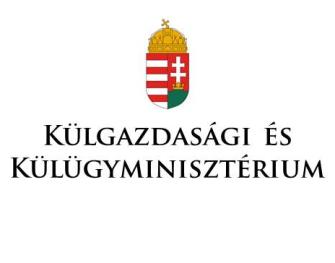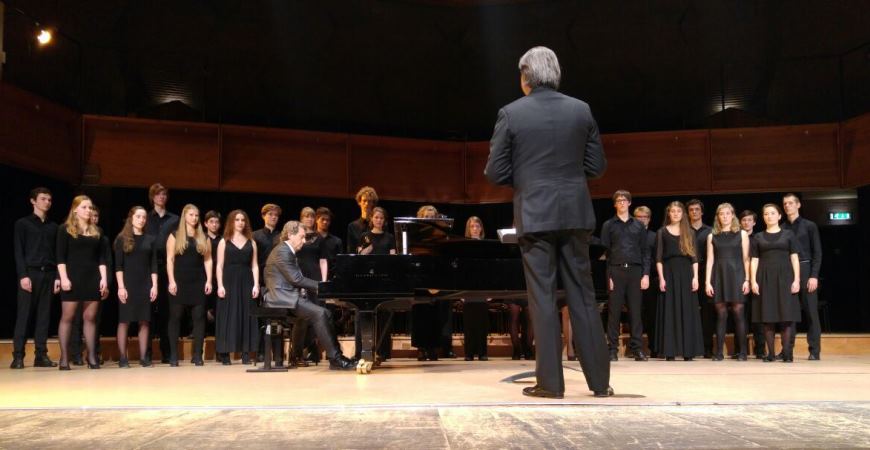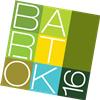The international programme series Bartók 135 in The Hague
After Tokyo, Helsinki and Zagreb, the fourth site of the joint programme series of the Ministry of Foreign Affairs and Trade and the Liszt Academy came to be the Peace Palace in The Hague.
On 17 and 18 November, three professors of the Liszt Academy, Kálmán Dráfi, László Norbert Nemes and László Vikárius gave masterclasses to the academic staff and the students of the Royal Conservatoire of The Hague on various aspects of Bartók’s work. The weekend courses, however, turned into a music festival thanks to the public rehearsals, performances and concerts.
Click here for the gallery of the international programme series Bartók 135
On 17 November, during the usual carillon, the bells now played Bartók’s pieces in order to herald the evening concert opening the festival. In the 103-year history of the Peace Palace, it was now for the first time that live music had been performed in the Auditorium. The introductory lecture of the library director of the Peace Palace, Jeroen Vervliet, was followed by the presentation of the director of the Bartók Archive, the musicologist, László Vikárius, titled Brotherhood of peoples, Bartók in war and peace. The Bartók music inserts in the course of the presentation were performed by Rutger Jansen, one of the eminent students of the Royal Conservatoire of The Hague, the Hungarian-born music professors Katalin Kovács and Éva Szalai now residing in the Netherlands and by Kálmán Dráfi, the Head of the Keyboard Department of the Liszt Academy. The institution home to several prestigious organisations such as the International Court of Justice– similarly to the Liszt Academy in Budapest – is an awardee of European Heritage Label, and accordingly, this cooperation initiative came about within the exclusive circle of awarded institutions.
Click here for the gallery of the international programme series Bartók 135
The four-day long Bartók festival featured a uniquely colourful and complex programme: besides the two-day piano and choir conducting masterclasses, lectures, music workshops and several concerts - all relating to Bartók’s compositions- were making the event more special. The major venues of the festival were the concert halls and the main building of the Royal Conservatoire of The Hague, a high-priority partner of the Liszt Academy. In addition to the academic staff and regular students, also the participants of the one-semester postgraduate teacher training course and the members of the Dutch National Youth Choir attended the event. Within the framework of the masterclasses, the participants could also admire the digital exhibition Microcosmos – Introduction to the World of Béla Bartók arranged jointly with the Hungarian Embassy.
Click here for the gallery of the international programme series Bartók 135
The workshop Analysis and performance, which analysed Bartók’s Contrasts from various perspectives, was the pioneering initiative of the Royal Conservatoire of The Hague. In the course of this workshop, Kálmán Dráfi touched upon the artistic interpretation, while László Vikárius addressed the music historical aspects of the composition, then Paul Scheepers, professor of music theory analysed the work with the help of a trio of the conservatoire. Both the Contrasts, the related lecture of Prof. Scheepers and the Romanian Folk Dances were performed by the trio of the Royal Conservatoire (Ellen Corver, Head of the Piano Department - piano, Joseph Puglia - violin, Jasper Grijpink - clarinet) and by Prof Kálmán Dráfi.
Click here for the gallery of the international programme series Bartók 135
The festival’s gala concert in the grand hall of the Royal Conservatoire of The Hague held on 19 November was dedicated to the memory of Zoltán Kocsis - who was bidden farewell to at the Liszt Academy on the very same day in Budapest – by Kálmán Dráfi. He recalled Bartók’s most authentic interpreter with warmth, as a close friend, student, teacher and artist.
The Dutch National Youth Choir sang Bartók’s choral works in Hungarian and Slovakian, and as an encore, they performed György Kurtág’s highly challenging piece, Night and Morning (Éjszaka és Reggel). In the second part of the concert, Peter Vigh’s composition commemorating the 1956 Revolution And we are looking for the truth (És keressük az igazságot) was put on stage with the kind support of the Hungarian Embassy of The Hague. The piece was written by the young composer of Hungarian ancestry for the Grachtenfestival in 2016. The audience – with a number of most prominent guests, such as ambassadors and high-ranking officials of international organisations (like the Secretary General of Europe Nostra, the pan-European cultural heritage organisation awarding the Liszt Academy), important cultural contacts from other embassies or universities as well as the executives of Holland-based Hungarian organisations all invited by the Embassy – rewarded the young Dutch and Hungarian artists and professors with a strong applause. The international programme series jointly organised by the Ministry of Foreign Affairs and Trade and the Liszt Academy will continue in Jerusalem, London, Tbilisi, Warsaw and Rome.
Click here to read more about the programme series and its sites.
|
|  |




